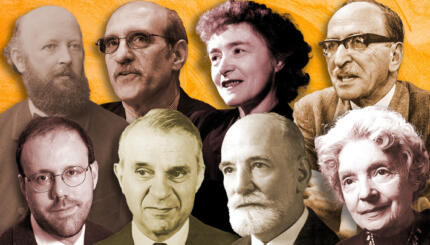Reprinted with permission from the
The Independent
(June 11, 2005).
There’s a telling moment in the discussion after the performance of Plonter. A man asks the cast crossly why the settler women depicted in the play in long dresses and hats of the sort worn by many religious Jewish women, all “look the same.”
No more so, the Jewish director, Yael Ronen, points out, than the mourning Palestinian women grieving over the death of an 11-year-old boy. Or, says one of actors, Asaf Pariente, the equally stereotyped keffiyeh-clad Hamas gunmen who promise eternal vengeance after an Israeli soldier shoots the child dead. Caught out, the audience member lets a rueful half smile, in what just might be sudden self-awareness, flit across his face.
About Plonter
This play, set against the dark background of occupation and intifada, repeatedly challenges its audience to realize that the “others” are individuals too. At the climax of the piece–“Imbroglio” in English–the haunted Israeli soldier who has helped to cover up the killing, suddenly sees the Palestinian mother and her child in his living room. “Can’t you see there are people there?” he asks his uncomprehending, and of course, unseeing wife.
With your help, My Jewish Learning can provide endless opportunities for learning, connection and discovery.
It’s one of the oldest of all dramatic devices. But the line has a double meaning, half of which is a resonant appeal to understand the suffering on the other side of the psychological, as well as increasingly physical, wall separating Israelis from Palestinians.
Without an initial script, Plonter is the outcome of an intense and extraordinary collaboration between Ronen, 29, and a talented cast of young professional Israeli Arab and Jewish actors, who improvised, argued, and finally bonded for seven months to create a work that confronts, often painfully but sometimes with savage humor, its audiences with the human realities on both sides.
The sketches weaving together the lives of an Israeli and Palestinian family, each tormented in its own way by the conflict, linger in the memory long after the performance ends: the Palestinian husband goaded by his wife over his apparent passivity in the face of their son’s death; the young Israeli woman trying to reach out to her soldier husband after her own stridently left-wing activist sister has accused him of being a “war criminal”; the Palestinian man on a bus who angrily confronts his suddenly terrified fellow passengers by stripping down to his underpants.
Opening Minds
The versatile cast set out to confront the complexities of the conflict. For the mainly left-wing Jewish actors, for example, this meant, says Ronen, understanding soldiers and settlers as well as Palestinians. “The first thing we had to do was to destroy every opinion we had about the conflict,” she says. “We wanted to expose our own ignorance and prejudice, our lack of knowledge of ourselves and others.”
“We had to try and be neutral and not emotional,” says Ashraf Barhoim, an Arab actor who, in one of several crossovers, plays an Israeli soldier as well as the suspected suicide bomber.
Thus, a settler couple whose child is killed in a Palestinian attack are treated with sympathy; on the other hand a group of settler women evading a soldier trying to evacuate them by throwing a baby like a frisbee from hand to hand until he is, shockingly, dropped, makes a highly charged point about the involuntary exposure of children to the conflict. As does one of the most disturbing scenes: a group of Palestinian children vying, as if in a game, for a suicide vest to avenge their dead 11-year-old school friend.
A Lot To Learn
Ronen says the cast did not, as they worked on the play, think much about the audience “or whether people would be angry with it.” But she agrees that it is Israelis who have the most to learn from Plonter.
“Unlike for Palestinians what’s happening is not a matter of everyday life for them. They have the privilege of behaving as if [the occupation] didn’t exist every moment of the day, until, that is, a terror attack comes to their doorstep and then they say ‘What do you want from us, why are you trying to kill us?'”
For a symbolic taste of Palestinian life, theatre-goers arriving at the play have to submit their ID to two aggressive actors in soldiers’ uniforms.
It has already been shown to Arab and Jewish schoolchildren, in an experiment that the thatre is busily seeking sponsorship to expand.
Anti-Occupation Ethos
The play doesn’t seek to come up with a detailed peace plan. But the cast is united by an anti-occupation ethos; they are of a generation marked as teenagers by the rising hopes and then the crushing disappointments of the Oslo agreement era.
Despite the darkness of much of the work, and her own admission that the audience probably “only comes half-way with us,” Ronen suggests there are some grounds for optimism in the mutual understanding the cast built among themselves through “real honesty and real dialogue” in rehearsal.
“Of course if we can do it, and if the audience gets involved, they will be able to do it too.” She cites one minor example. In one scene, the dead Palestinian child’s distraught mother, compellingly played by Raida Adon, composes herself for the TV cameras to say how happy and proud she was to have a “martyred” son before lapsing back into inconsolable grief.
Ronen says that in the discussion after one performance a Jewish high school pupil aged 16 said that she “had seen this so often before, but now she understood what the mother was really feeling.”


